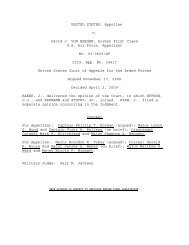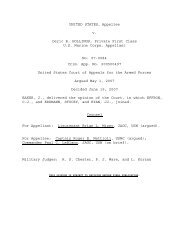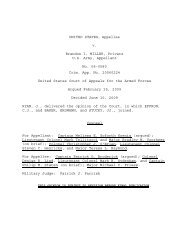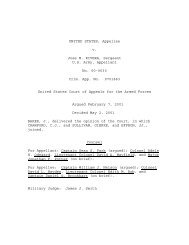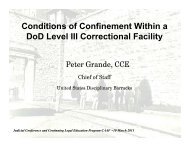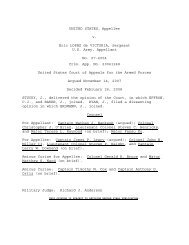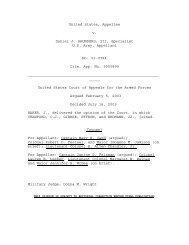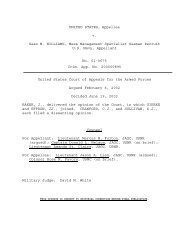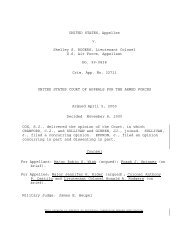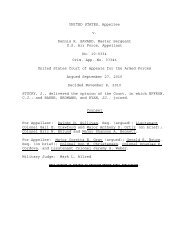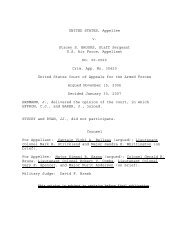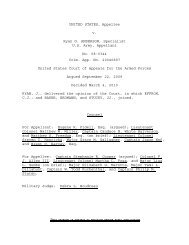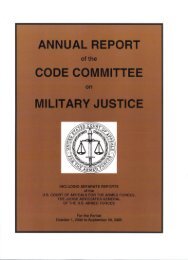U.S. v. Othuru - U.S. Court of Appeals for the Armed Forces
U.S. v. Othuru - U.S. Court of Appeals for the Armed Forces
U.S. v. Othuru - U.S. Court of Appeals for the Armed Forces
You also want an ePaper? Increase the reach of your titles
YUMPU automatically turns print PDFs into web optimized ePapers that Google loves.
United States v. <strong>Othuru</strong>, No. 06-0768/NA“[I]n <strong>the</strong> context <strong>of</strong> a particular case, certain constitutionalerrors, no less than o<strong>the</strong>r errors, may have been ‘harmless’ interms <strong>of</strong> <strong>the</strong>ir effect on <strong>the</strong> factfinding process at trial.”Delaware v. Van Arsdall, 475 U.S. 673, 681 (1986) (citationomitted). The Supreme <strong>Court</strong> has determined “that <strong>the</strong> denial <strong>of</strong><strong>the</strong> opportunity to cross-examine an adverse witness does not fitwithin <strong>the</strong> limited category <strong>of</strong> constitutional errors that aredeemed prejudicial in every case.” Id. at 682 (citingHarrington v. Cali<strong>for</strong>nia, 395 U.S. 250, 254 (1969)). As <strong>the</strong>error here involves <strong>Othuru</strong>’s Sixth Amendment right to crossexamine<strong>the</strong> witnesses, we may test this Confrontation Clauseerror <strong>for</strong> its effect upon <strong>the</strong> trial to determine whe<strong>the</strong>r <strong>the</strong>error was harmless beyond a reasonable doubt. See id. at 684.The Government bears <strong>the</strong> burden <strong>of</strong> establishing that aconstitutional error has no causal effect upon <strong>the</strong> findings.United States v. Simmons, 59 M.J. 485, 489 (C.A.A.F. 2004);United States v. Bins, 43 M.J. 79, 86 (C.A.A.F. 1995). To meetthis burden <strong>the</strong> Government must demonstrate that <strong>the</strong>re is noreasonable possibility that <strong>the</strong> presence <strong>of</strong> <strong>the</strong> two testimonialstatements contributed to <strong>the</strong> contested findings <strong>of</strong> guilty.United States v. Kreutzer, 61 M.J. 293, 300 (C.A.A.F. 2005)(citing Gutierrez v. McGinnis, 389 F.3d 300, 307-08 (2d Cir.2004)).To say that an error did not “contribute” to <strong>the</strong>ensuing verdict is not, <strong>of</strong> course, to say that <strong>the</strong>6



